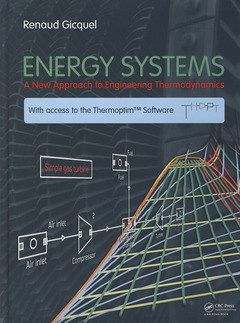Energy systems: A new approach to engineering thermodynamics A New Approach to Engineering Thermodynamics
Auteur : Gicquel Renaud

Renaud Gicquel is Professor at the École des Mines de Paris (Mines ParisTech), France. He has a special interest and passion for the combination of thermodynamics and energy-powered system education with modern information technology tools and developed various software packages to facilitate the teaching of applied thermodynamics and the simulation of energy systems.
Professional background: Renaud Gicquel was trained as a mining engineer and obtained his PhD in the same discipline an the Paris VI University in Paris. In the early eighties, he started his professional life as a Special Assistant to the Secretary General at the United Nations Conference in New York on new and renewable sources of energy. After positions at the French General Electric Company and the Ministry of Research and Technology, he was the advisor for Internatioanl Issues at the Centre National de la Recherche Scientifique (CNRS). IN 1986, together with Michel Grenon, he founded the Mediterranean Energy Observatory (OME) in Sophia Antipolis in the South of France. In the early nineties, he was the Deputy Director of the Ecole des Mines de Nantes (EMN) and Head of the Energy Systems and Environment Department. He also acted at the coordinator of ARTEMIS, a thermal energy research group, which he created in partnership with the University of Nantes and Polytech Nantes. Since the mid eighties, Dr Gicquel continued his academic career at the Centre for Energy Studies of the Ecole de Mines de Paris. Acting as the head and as a full professor, he teaches applied thermodynamics, global energy issues and energy system modeling. His research activities are focused on the optimization of complex thermodynamic plants and on the use of information and communication technologies for scientific instructions. He developed several software packages and published two textbooks. To facilitate the student’s learning of applied thermodynamics and the simulation of energy systems better, he dev
Date de parution : 01-2012
Ouvrage de 1012 p.
21x28 cm
Disponible chez l'éditeur (délai d'approvisionnement : 13 jours).
Prix indicatif 222,92 €
Ajouter au panierThèmes d’Energy systems: A new approach to engineering thermodynamics :
Mots-clés :
combustion, compression, conversion, desalination, energy, energy cycle, energy systems, gas, nuclear, power, pumps, reactors, renewable energy, solar, steam, thermal, thermodynamics, turbines



